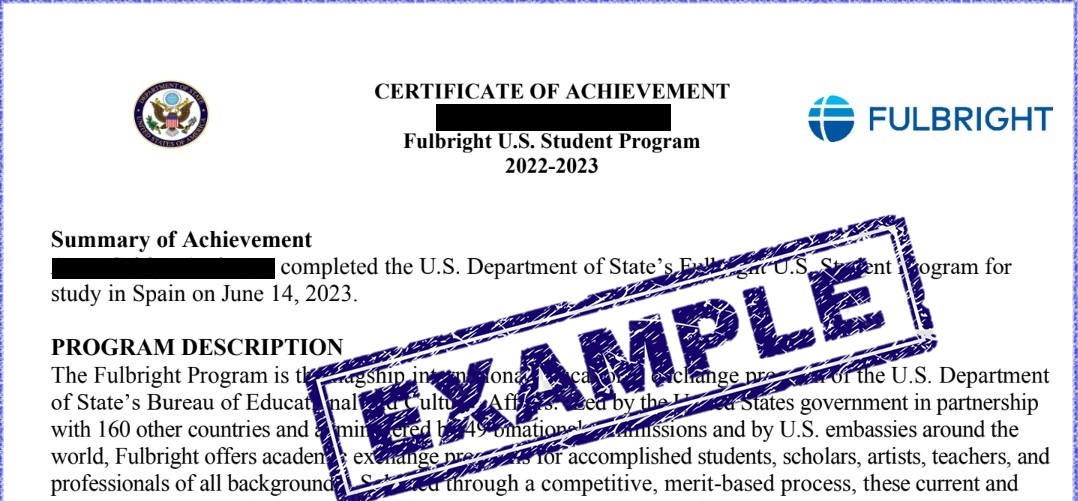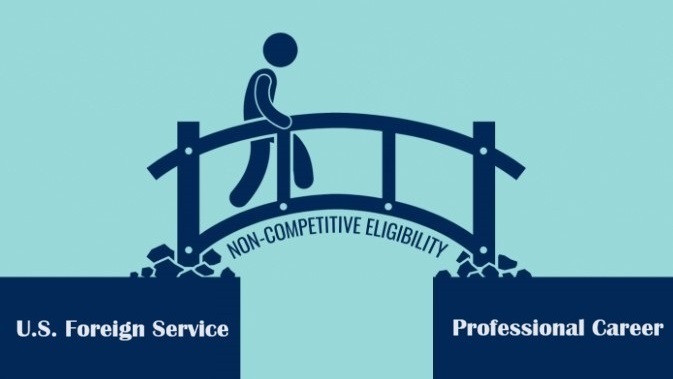U.S. Reentry
fulbright Non-Competitive Eligibility (NCE) STATUS
“Non-Competitive Eligibility” (NCE) typically refers to a status granted by certain government programs or organizations that exempts individuals from the normal competitive selection process. For instance, in the context of the United States government’s Peace Corps, AmeriCorps, or other similar programs, NCE is granted to participants who have completed their service commitment. This status allows them to apply for certain federal jobs without having to compete with the general public. It provides these individuals with a distinct advantage in the federal job application process.

Executive Order 13750 issued under the Administration of Barack Obama, 2016, confers Non-Competitive Eligibility (NCE) to certain alumni of the Fulbright U.S. Student Program, the Benjamin A. Gilman International Scholarship Program, and the Critical Language Scholarship (CLS) Program, Participants in these programs develop advanced- to superior-level skills in languages and cultural competence in regions that are strategically, diplomatically, and economically important to the United States.
The Fulbright Spain Commission does not confer this status and therefore cannot offer official answers about how it may be used. As this is a common question, one grantee took the initiative to put together everything the Commission researched regarding NCE Status Information in this document.
You may find many of the basic answers you need here: https://us.fulbrightonline.org/alumni/non-competitive-eligibility-faqs and here: https://us.fulbrightonline.org/alumni/us-student-re-entry-resources/professional-development
By clicking the small screen icon beneath “Non-Competitivity Eligibility” on the second link, it will show even more details about finding government jobs. This is all the information we have been able to obtain for grantees regarding this matter, for further questions, please reach out to your IIE contact at: FulbrightStudentAdvisingEUR@iie.org.

CAREER COUNSELING
Commission Staff members are Grant Administrators (not Career Counselors nor Academic Advisors). As such, we do not have resources beyond these featured on the Online Guide to provide support in regards to achieving your long-term objectives and professional aspirations.
In addition to the NCE information above, this Fulbright Resumé Guide with some tips on how to list or describe your Fulbright Grant experience may prove useful.
Another great way to prepare to enter the next phase of your professional life is to join one of the many Fulbright Networking Groups and find fellow Fulbrights who share your professional interests (Scroll down for a complete list!).
Lastly, our legal knowledge at the Commission is limited to the immigration processes related to obtaining Spanish student visas specifically for Fulbright grants. We cannot provide accurate information on obtaining a student visa or prórroga de estancia (extension of your legal stay in Spain) through other programs. You can also set up a consultation with an immigration lawyer to go over any doubts you have about non-Fulbright related visas or renewal processes in Spain, as it part of the Grant Conditions that you leave Spain at the end of the Grant period.
Preparing for Cultural Adjustment
”Reentry into your home culture can be both as challenging and as frustrating as living overseas, mostly because our attitude toward going “home” is that it should be a simple matter of getting resettled, resuming your earlier routines, and reestablishing your relationships. However, world wide research has shown that reentry has its own set of special social and psychological adjustments which can be facilitated by being aware of the reentry process and following some advice from those who have already returned.” –Dr. Bruce LeBrack (School of International Studies, University of the Pacific, Training Design for International Transitions, La Brack and Pusch, SIIC)
We encourage you to review the following materials as your prepare to return home.
1. Returning Home – Reverse Culture Shock – Office of International Students and Scholars at Yale University
2. Reverse Culture Shock: What It Is and How to Respond – Diversity Abroad
3. After Going Abroad: A Re-Entry Handbook for Returning Students – University of California, Santa Cruz
Re-Entry Checklist
- Review the IIE Re-Entry Resource Center.
- Complete Final Report by the deadline provided by IIE
- Check updated travel restrictions, before making final departure plans
- Special Note: ASPE coverage will begin and end according to grant dates and will only be in effect when you are in the host country during the grant dates. This benefit is only valid for travel directly to and from the host country, immediately prior to and after a U.S. Department of State exchange program.
- Update my resume to include experiences and skills gained during my Fulbright grant
- Thank those who have helped make this experience possible (family, friends, faculty, mentors, members of Congress, host country sponsors, etc.)
- Finalize my financial commitments (phone plan, internet plan, gym memberships)
- Make a plan to sell or donate furniture, clothing, or other items you won’t be taking back with you
- Close my bank account
- Convert my remaining local currency to U.S. currency
- Check for final flight updates to airline and pack suitcases
- Complete IIE arrival survey when instructed
- Continue to fulfill the Fulbright mission by sharing my experience abroad
- Connect with my home university or IIE for outreach and ways to share my Fulbright experience as an alumni
- Join ECA’s International Exchange Alumni website for professional development resources and networking opportunities
For further support as you transition to your return to the U.S. after your Fulbright grant, you can reach out to the Reentry program of IIE at reentry@iie.org and your local Fulbright chapter.
ALUMNI CONNECTIONS
One of the lasting benefits of receiving a Fulbright award is joining the global network of passionate and accomplished alumni serving as leaders in academia, business, government, and other fields. As incoming Fulbrighters, we highly encourage you to reach out to and stay in touch with alumni – there is no one better to tell you what works and what doesn’t, both before and during your time in Spain. As helpful as websites and guides can be, advice from personal experience is truly what will help you get the most out of your Fulbright experience.
Here’s how you can get (and stay) in touch:
The Fulbrighter app allows participants to establish groups and create pages tailored to their interests. This free and private platform allows Fulbright alumni around the world to connect, network, engage, and collaborate with the ease of one shared network. Launched in August 2019, the Fulbrighter app already has over 10,000 users. Current Fulbright participants may also register to join. Fulbrighters may access the platform at https://fulbrighternetwork.com or download it to a smartphone from the App Store and Google Play.
THE FULBRIGHT ALUMNI
ASSOCIATION IN SPAIN
The Spanish Fulbright Alumni Association (Asociación de Exbecarios Fulbright) is somewhat active, although mainly in Madrid, organizing monthly conferences (tertulias) and special gatherings throughout the academic year.
Its members are mostly Spaniards, but current and former American grantees are welcome to join them and their activities. For more information, visit www.asoc-fulbright.es and connect with them on Facebook and LinkedIn.
THE FULBRIGHT ASSOCIATION IN THE U.S.
The Fulbright Association (FA) is the U.S. alumni organization of the Fulbright Program, representing over 140,000 alumni. Through its 54 local chapters across the country, the FA serves as a hub for Fulbright alumni to share ideas, network, find jobs, and advocate for international education and cultural understanding around the world.
The Fulbright Association is the membership organization of Fulbright alumni and supporters committed to fostering international awareness and understanding through advocating increased worldwide support for Fulbright exchanges, enriching the Fulbright experience, and facilitating lifelong interaction among alumni and current participants. For membership information and a complete guide of activities and services, visit www.fulbright.org. We encourage you to also follow their social media pages: LinkedIn, Instagram, Facebook, and Twitter.
STATE ALUMNI
State Alumni is a dynamic and interactive networking experience for all past and current participants of U.S. government-sponsored exchange programs. You can find alumni in your country and in all regions of the world, share your ideas, learn from alumni, and find out about alumni activities being implemented in communities around the world.
You can prepare your research through State Alumni’s Online Resource Center and access over 20,000 U.S. and international periodicals, newspapers, and more. For more information, visit alumni.state.gov and connect with them on Facebook, LinkedIn, and Twitter.